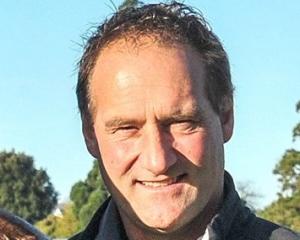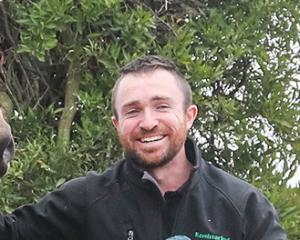Barry Kitto has been everpresent around racetracks in the South Island for more than 30 years. But he has hung up his boots. Racing reporter Matt Smith catches up with Kitto and the job he put a full stop on.
At first glance, it appears retired racing investigator Barry Kitto has not travelled too far in the past 70 years - just a shortcut over Mt Cargill, a quick swim across Otago Harbour to Broad Bay and there you are.
That's not strictly true, but Kitto is quite happy on his own spot of paradise nestled into the hills at the Otago Peninsula settlement.
The native birds swooping by and 0.4ha of rolling terrain and gardens have provided a soothing outlet for Kitto from the rigours of work over the past four years since he and wife Jill moved back to Dunedin after 30 years in Christchurch.
Kitto (70) retired from the Racing Integrity Unit last week after 35 years as a racecourse detective, racing investigator and various other job descriptions bestowed upon him over the years by the racing hierarchy.
"Investigator''is arguably the most accurate, as Kitto delved into raceday duties such as organising the swabbing of winners, along with stable inspections and investigations into drug offences.
But working in the racing industry was far from Kitto's mind when he joined the police as a 17-year-old cadet in 1963, putting in 18 months as a cadet at Trentham before returning to Dunedin until 1981.
"I loved the police - I really enjoyed the police and if I hadn't gone into this job, I would have seen out the full career in the police.''
However, Kitto was approached by former colleague Doug Williams and chief racecourse inspector Jim Fleming to see if he was interested in being a racecourse detective.
"I hadn't really given it any thought to be honest - I was happy where I was.''
But as the Kittos investigated (excuse the pun) further, the more structured hours compared to the shift work in police certainly appealed.
"One of the attractions was that the life would be more stable than in the police. There were times when we had young children when I was away for months on a few inquiries, and that's hard work for families.''
And a chat to former colleagues who had taken up racecourse detective roles sealed it.
"One thing was apparent to me very early - all of them had retired as inspectors. None of them had been in for a short time. I thought to myself there's got to be some job satisfaction. It was a big decision, but it's a decision I haven't regretted one inch.''
Kitto grew up on the famed Baldwin St, and attended Otago Boys' High School before his time in the police.
After six months with Williams in 1981 learning about thoroughbred racing, he transferred to Christchurch to work in harness racing.
His decision to "get myself up to speed'' in thoroughbred racing would pay off 30 years later when the thoroughbred, harness and greyhound codes combined to establish the Racing Integrity Unit.
Kitto has had to deal with the tougher side of the industry, the Blue Magic scandal in the mid-2000s the most high-profile investigation to rock harness racing.
"Some of them are quite involved and some of them had very sad endings which no-one wishes to happen,'' he said.
"But the serious investigations are what makes the blood pump through the veins - particularly from the police background, because it's not the run-of-the-mill change of ownerships or something like that.''
Despite seeing the worst side of the racing industry, Kitto is firm in his belief the industry is made up of thoroughly good people.
"With racing, I don't like to put a percentage on it. I could say 99.9% of the people are good and I could be wrong - it might be 99.8%.
"But what I'm saying is the great majority of people in racing are really decent people.
Considering the size of the racing industry in New Zealand, integrity issues were a "fact of life''.
"There's no workplace in the world that doesn't have issues, but to try and put it in perspective, I think NZ racing is very good and, generally speaking, it's fair to say it's clean and honest,'' he said.
"In my experience, even the more serious things I've dealt with have involved carelessness or negligence as opposed to deliberate or intentional. When that is the case, you treat it accordingly, as accidental. Conversely, if someone is deliberately cheating and there is an intention or purpose for it, we'll snap at the ankles all right, make no mistake about it, and we'll go after them.''
Kitto derived great pleasure from his 25 years working with the cadets in Canterbury harness racing, and watching future stipendiary stewards, administrators and drivers such as Dexter Dunn come through the system.
"Some of them weren't born when I started - that scares me really - but I've watched them flourish through their families,'' he said.
"Quite frankly, I admire the young people we have in the industry and I admire the trainers. If you get a whiteboard and see what it requires to get a horse to the races, there's a lot of writing on it.''
Southland stipendiary steward Chris Allison has taken over Kitto's role, and Kitto is grateful to Allison and Mosgiel stipendiary steward Mark Davidson for their teamwork since he returned to Dunedin.
"We're all part of the same team, but I've felt fortunate coming back to Dunedin with those two in those positions - they're senior staff and mature men and I'd say the industry is well served by them.''
So what now for Kitto, other than spending time with his wife, four children, 13 grandchildren and one great-grandchild?
"You've caught me at it,'' Kitto chuckled.
"I'm 2IC [second in charge] in the garden. Jill and I love gardening - she's the head gardener and I'm the labourer. We work pretty well together.''









